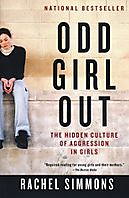
The privilege of a lifetime is being who you are. --Joseph Campbell
Did you like Mira's posting on cliques?? I was really proud of her...she went on a field trip at school and a girl she has known since 2nd grade won't talk to her now because she thinks she is more popular than Mira. Mira doesn't have much tolerance for that kind of stuff I guess.
I am proud of her...........Love, Michele
In Odd Girl Out Rachel Simmons attempts to contextualize and explain the many indirect ways school aged girls express anger. Simmons spent a year interviewing women and girls about their experiences with bullying, and what Simmons calls alternative aggressions; the gossiping, rumor spreading, alliance building and silent treatments girls use to express negative feelings toward one another.
Simmons posits that our society does not allow girls direct access to conflict. From a young age they are taught to be “good.” Unlike boys who are allowed to be openly rough, rowdy, and competitive, “good girls” learn to be passive,  accommodating, nice to everyone, and to never ever get into fights if any description. They also learn that they are defined by their relationships. These potential wives, mothers, and teachers realize early on that their proximity to specific people is what gives them their value and identity. In our younger years our friends make up our world. This is particularly true of girls who often view social isolation as the worst form of punishment. Without friends to define them they are nothing. The desire to be “good” combined with the desire to maintain perfect friendships leads girls to express their feelings of anger and hurt in the covert and often cruel form of alternative aggressions.
accommodating, nice to everyone, and to never ever get into fights if any description. They also learn that they are defined by their relationships. These potential wives, mothers, and teachers realize early on that their proximity to specific people is what gives them their value and identity. In our younger years our friends make up our world. This is particularly true of girls who often view social isolation as the worst form of punishment. Without friends to define them they are nothing. The desire to be “good” combined with the desire to maintain perfect friendships leads girls to express their feelings of anger and hurt in the covert and often cruel form of alternative aggressions.
This book offers so much food for thought. I found Simmons discussion of abusive friendships particularly compelling. Girls on the whole are more likely to bully close friends than strangers or acquaintances. Over night best friends can become worst enemies, one friend relentlessly bullying the other for reasons unknown to the victim. However, the victim often tries to preserve the abusive friendship even at the cost of her own confidence and self-esteem. She is willing to make those sacrifices in order to avoid social isolation. Reading accounts of girls trapped in these friendships, I was shocked at how much the bullied girls sound like battered women. Their justifications for remaining in these obviously dangerous relationships echo those given by victims of spousal abuse: (s)he apologized and said it would never happen again, (s)he didn’t mean what (s)he said, (s)he’s nice to me sometimes. They blame themselves, assuming they must have done something awful to warrant such abuse. Simmons recognizes this parallel and worries that by teaching girls to care more about what other people think of them than how they feel about themselves makes them more susceptible to violence.
In the final chapter Simmons offers suggestions on how teachers, parents, and schools in general can support victims of alternative aggressions. Parents are encouraged to listen and soothe children rather than blame them or offer advice. Teachers are asked to learn how to identify alternative aggressions and to make sure the children in their classroom know that such behavior will not be tolerated. She implores schools to write specific policy concerning alternative aggressions and to be consistent in enforcing it. While I have my doubts about how effective the aforementioned plan of attack would be in practice, Simmons ideas are certainly worth considering.
As a victim of relentless childhood bullying myself I found comfort and understanding in Simmons words. Her research gave me a social context in which to view my days of junior high school torment and would highly recommend it to anyone who is dealing or has dealt with bullying.
Bullying should not have to be an unavoidable part of growing up. Alternative aggressions can destroy a young girl’s confidence, self-esteem, and even shatter her identity. Once you’re done with Odd Girl Out you will feel just as strongly as the author that we must do something to stem the tide of girl bullying before all our daughters suffer permanant damage.









No comments:
Post a Comment